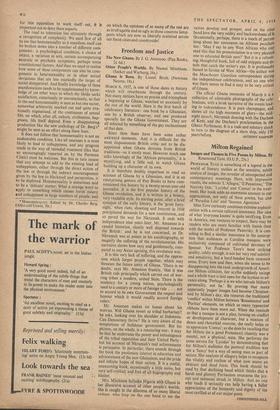Milton Regained
Images and Themes in Five Poems by Milton. BY Rosemond Tuve. (O.U.P., 25s.) PROFESSOR TUVE is something of a legend in the world of literary studies as the sensitive, subtle analyst of images, the revealer of unsuspected and contemporary meanings. Here, with impressive
results, she submits 'IL Penseroso,"The Nativity Ode,' Lycidas' and 'Comus' to the treat- ment. Her book adds an enormous amount to our appreciation, not only of these poems, but also of 'Paradise Lost' and 'Samson Agonistes.'
Miss Tuve curiously combines extreme sophisti- cation with a certain cultured innocence. Her idea of what 'everyone knows' is quite terrifying. Even in America, one ventures to suspect, there may be readers who are more familiar with Isaiah than with the works of Professor Panovsky. It is con- soling to find a similar innocence in the assump- tion that audiences at Caroline masques were exclusively composed of cultivated devotees of Spenser. Yet Professor Tuve's most striking quality, oddly enough, is not her very real subtlety and sensitivity, but a hard-headed basic common sense. Every now and then, when she seems to be disappearing into the rank undergrowth of Ameri- can Milton criticism, her scythe suddenly swings and a whole tract is laid open for the layman to ad- vance along. 'Perhaps it is we who intrude Milton's personality, not he.' By proving that many apparently `pagan' images had become Christian- ised by Milton's day, she removes the traditional `conflict' within Milton between 'Renaissance' and `Puritan' elements, on which so many typewriter ribbons have been worn out. When she reminds us that a masque is not a play, turning on conflict or development of character, but a mixture of dance and rhetorical exercise, she really helps us to appreciate 'Comus'; as she does by recalling that for Milton (as a good Protestant) chastity was a mental, not a physical, state. She performs the same service for Tycidas' by demonstrating that for Milton's audience the pastoral tradition was not a 'fancy' but a way of seeing man as part of nature. Her analysis of allegory helps to recapture the vitality and realism of what now seems an abstract and dead form. This book should be read by that declining band which thinks that a harsh and gloomy Puritanism overcame the joy- ous and sensuous streak in Milton. And no one who reads it seriously can help having a fuller appreciation of the humanity and dignity of the most cavilled-at of our major poets.
CHRISTOPHER HILL






























 Previous page
Previous page